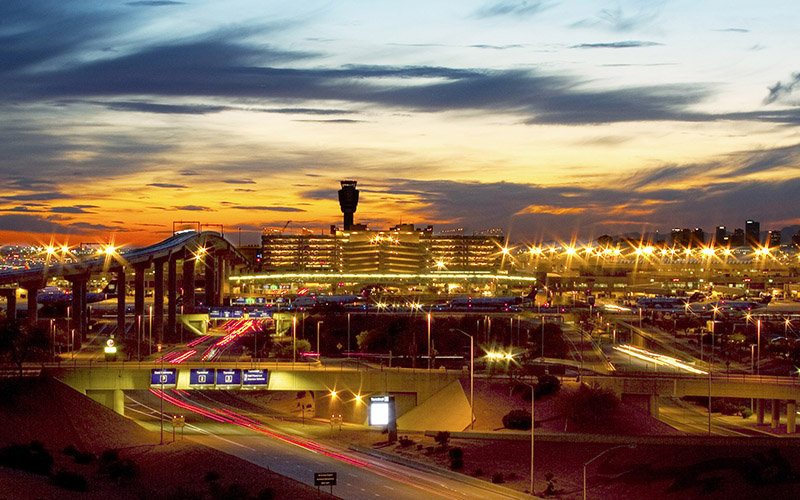WASHINGTON _ Neighbors of Phoenix Sky Harbor International Airport filed 24,247 complaints about noise at the facility in 2015, one of the highest rates among airports studied in a recent George Mason University report.
The report by the university’s Mercatus Center looked at airports like Sky Harbor, where the FAA’s implementation of its NextGen navigational system led to spikes in noise complaints as a result of flight-path changes.
Sky Harbor trailed only San Francisco International Airport, which logged an astronomical 890,376 complaints. But Sky Harbor was well ahead of the next airports in line, Los Angeles International with 8,862 and Washington-Reagan National Airport with 8,760.
Residents near Sky Harbor were not surprised by the numbers – and do not think things have improved in the past year.
“My experience (with noise in 2016) has been about the same from more than two years ago when the flight paths changed,” said Steve Dreiseszun, a resident in Phoenix’s historic district. “There has been no improvement.”
The Mercatus Center report said the Sky Harbor complaints were submitted by 1,338 households in 2015, with just 13 of them accounting for 3,814 of the complaints.
Phoenix residents and city officials alike charged that federal officials are not doing enough to respond to their complaints.
Phoenix homeowner Beth Malapanes said the only reprieve she got from the airport noise was on Thanksgiving Day – but she paid for it during the rest of the busy travel weekend, when planes flew over her home every 10 minutes for three days.
“We’re still experiencing the same issue,” Malapanes said. “Every time the wind comes from the west, planes have to take off over our home. Storms and clouds amplify the sound – that’s really all you hear.”
Residents and airport officials alike blame the increased number of noise complaints on the FAA’s 2014 decision to implement NextGen, which altered flight paths in an effort to streamline arrivals and departures at the airport. They said the change was made with little public notice or input.
The Sept. 18, 2014, change was supposed to enhance departures and arrivals using communication between satellites and on-board airplane equipment to “navigate with greater precision and accuracy.”
After months of discussions and stalled negotiations regarding the noise complaints, the city of Phoenix sued the FAA in June 2015. But Sky Harbor was not the only airport to see noise complaints rise after the start of NextGen: Similar lawsuits have been filed in Boston, New York and throughout California.
Sky Harbor spokeswoman Heather Lissner said the city’s aviation department has been “actively involved” in working to “address flight path concerns” voiced by the community. That includes continuing to press the city’s lawsuit against the FAA, she said.
Dreiseszun, who runs the “Let’s Make Some Noise” Facebook page for airport noise complaints, said the problem does not lie with airport or city officials. He blames Congress and the federal courts, who have the power to impose a new set of flight path standards that would address these concerns.
“It does not appear that the FAA is willing or interested in making substantive changes that are appropriate,” Dreiseszun said. “And that is the main source of our challenge right now.”
Arizona Sens. John McCain and Jeff Flake added language this spring to the FAA authorization bill that would create an advisory committee to review the way the agency handles “consultation, or a lack of consultation,” with neighbors and local officials when implementing new rules at an airport. The committee would have to report back to Congress within a year with recommendations for improving the procedures.
In an emailed statement, an FAA spokesman said the agency is committed to “transparency, inclusivity and responsiveness,” but it also wants Sky Harbor to set up its own process for receiving complaints in person from nearby residents.
“We have encouraged the Phoenix airport to establish a noise roundtable to ensure that community representatives, the FAA, the airport and the airline industry are all part of the discussion about addressing noise concerns,” the statement read.
Dreiseszun said he and other residents in his neighborhood hope the new Congress will “come to the table and do this the right way” after convening in January.
“We will continue to struggle and we will continue to make our voices heard,” Dreiseszun said. “This is not an isolated incident, this is a national problem.”
